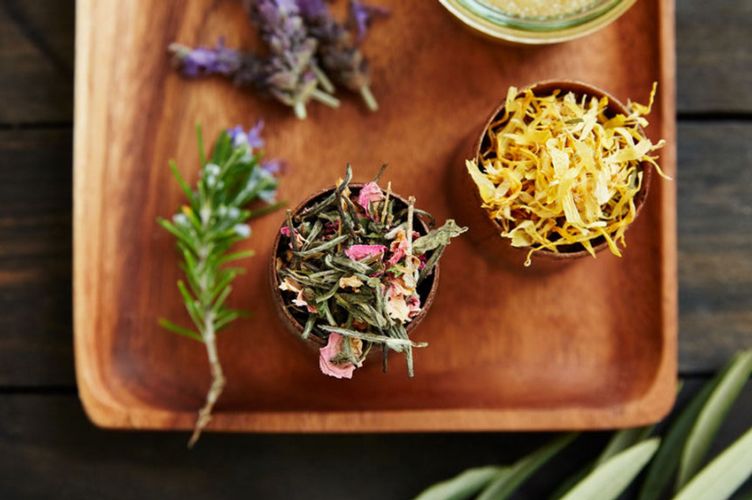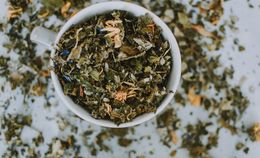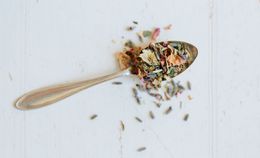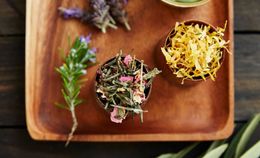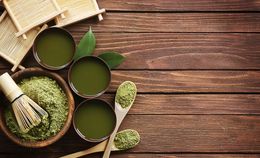Hashimoto’s Disease is a complex autoimmune condition that can manifest in the body through a vast number of symptoms and patterns. How can we help support the thyroid when things have been thrown off-kilter? In addition to crucial dietary and lifestyle changes, herbs can serve as amazing tools to help regain balance with Hashimoto’s Disease and to take control of your symptoms again. Read on to discover some of my go-to herbal therapeutics for supporting Hashimoto’s Disease.
Inflammation Modulation
Continued inflammation in the body has been shown to prolong and expedite disease processes across the board, including Hashimoto’s Disease. Whenever I work with a client to support their thyroid, I always assess what the potential roots of their inflammation could be, since they can vary person to person! After identifying the roots, it is important to try and remove or avoid them in order to see long-term benefits with your thyroid balance.
I bring up this note about inflammation here because it is very important not to simply cover up signs of inflammation when they appear in the body. Inflammatory markers are actually life-saving signs the body presents to help show you that something is amiss inside the body. My approach with herbs is to help down-regulate and modulate the inflammation while simultaneously addressing the root causes. Some of my go-to herbs for modulating inflammation are calendula (Calendula officinalis), ginger (Zingiber officinale), and cinnamon (Cinnamomum spp.).
Th1 + Th2 Support
If you have already been diagnosed with Hashimoto’s Disease, you are probably already familiar with these two important cytokines. By focusing on using herbs which modulate the function of these two hormonal messengers, deeper support and balance can be found with Hashimoto’s Disease. Two of my favorites include fresh chicory (Cichorium intybus) leaf and fresh dandelion (Taraxacum officinale) leaf. These are excellent tossed into salads and other savory dishes.
Bitters Bitters Bitters
Simply stated, bitter herbs can help streamline things in the body due to their profound effect on the liver. Since Hashimoto’s Disease can quite literally wreak havoc on the liver through inhibiting how many thyroid hormones become active (typically 60% of our thyroid hormones are converted from T4 to T3 in the liver), it is crucial to promote healthy liver function as part of your Hashimoto’s protocol.
Fortunately, there are MANY herbs which carry a bitter action and can be incorporated into bitters formulas. A few popular bitter herbs I like to use include: gentian (Gentiana lutea), burdock root (Arctium lappa), dandelion root, goldenseal (Hydrastis canadensis), and chamomile (Matricaria recutita). Herbal bitters are also easy and convenient to take in tincture form throughout the day. Simply sprinkle a few drops of the tincture directly all over the tongue before meals.
Adaptogens
As I am sure many people dealing with this condition can attest to, Hashimoto’s Disease is known to cause an increased stress response which directly impacts our energy levels day-to-day. Incorporating gentle adaptogens are a wonderful way to help foster stress resilience while instilling a deeper sense of calm and balance throughout the body. Some fundamental adaptogens to help support Hashimoto’s Disease are ashwagandha (Withania somnifera), rhodiola (Rhodiola rosea), and tulsi (Ocimum sanctum and O. tenuiflorum).
Know What Herbs NOT To Take
Depending on whether your Hashimoto’s is Th1 or Th2 dominant (or both!) it is crucial to make sure you limit or avoid certain herbs that can stimulate either of these hormonal messengers. After you confirm the dominance of your Hashimoto’s Disease with your doctor through the results of a lab test, cross-check this section to ensure that none of these herbs are part of your daily protocol.
Th1 Stimulating Herbs: astragalus (Astragalus membranaceus), echinacea (Echinacea spp.), licorice (Glycyrrhiza glabra), lemon balm (Melissa officinalis), panax ginseng (Panax quinquefolius), and chlorella (Chlorella vulgaris)
Th2 Stimulating Herbs: green tea (Camellia sinensis) extract, pine bark (Pinus maritima) extract, white willow bark (Salix alba), turmeric (Curcuma longa)
Herbs to Avoid in General with Hashimoto’s Disease: lemon balm, motherwort (Leonurus cardiaca), cannabis (Cannabis sativa)
As Always, Consult With Your Health Team
With Hashimoto’s Disease, I always suggest for my clients to consult with their entire health team when finding and creating a protocol that works for them. It is beneficial to consult with your primary healthcare provider first and make sure you are up-to-date on all of your labs and the severity of your Hashimoto’s, in addition to consulting with your Clinical Herbalist, Clinical Nutritionist, and other healthcare providers.
Are you working with Hashimoto’s Disease? Let me know which therapeutics have helped you in the comments below! Feel free to direct message me or comment below with any other questions you might have as well.

